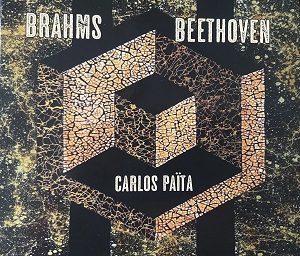Bei jedem neuen Album, das Le Palais des Dégustateurs mit dem Dirigenten Carlos Païta (1932-2015) herausbringt, wundere ich mich, wieso dieser argentinische Dirigent eigentlich so wenig bekannt ist.
Die Erste Brahms beginnt mit einem aufregend spontan wirkenden ersten Satz, den Païta nicht linear durchzieht, sondern mit für das Ohr ungewohnten Akzenten und Rubato belebt. Das Zögerliche und mitunter Schmerzliche der Brahmsschen Schwergeburt wird so ungemein deutlich.
Sehr bedeutungsvoll erklingt auch das Andante sostenuto. Der dritte Satz wird anfangs sehr ‘grazioso’ gespielt und dann wirkungsvoll gesteigert, um dem Finale entgegenzufiebern, das beängstigend düster beginnt, als sei größtes Unheil zu erwarten. Und es geht wirklich noch hoch dramatisch zu, ehe ein tiefer Atem langsam Zuversicht aufkommen lässt und die Musik dann gewinnend und mit grandioser Steigerung dem Ende zustrebt. Es ist dies eine großartige Aufnahme, eine der spontansten, packendsten und zweifellos besten dieser Symphonie!
Der erste Satz von Beethovens Siebter erhält bei durchaus ‘normalen’ Tempi eine ungeahnte Rhetorik, weil Païtas Hände überall im Orchester Details herausarbeiten und zu einem kohärenten Ganzen formen. Das ergibt eine großartige Spannung und einen Klangreichtum, der uns die Ohren für dieses oft lieblos heruntergespielte Werk öffnen. Nicht weniger spannend ist der fein differenzierte zweite Satz, während die beiden letzten das Tänzerische virtuos und wiederum aufregend detailreich darstellen.
Das zweite Programm beginnt mit einer fulminanten, ungemein kraftvollen Fünften Symphonie von Beethoven.
Darauf folgt eine klanglich extrem reiche, regelrecht blumige Interpretation des Violinkonzerts von Johannes Brahms mit der Anfang des Jahres verstorbenen türkischen Violinistin Ayla Erduran. Auch dies ist eine Aufnahme, in der so vieles ungewohnt und neuartig klingt, dass man sie unbedingt entdecken sollte. Auffallend ist vor allem der spontane Dialog zwischen der Solistin und dem Dirigenten.
With each new album released by Le Palais des Dégustateurs with conductor Carlos Païta (1932-2015), I wonder why this Argentinian conductor is so little known.
The Brahms First begins with an excitingly spontaneous first movement that Païta does not conduct in a linear mode, but enlivens with accents and rubato that are unusual to the ear. The hesitant and at times painful nature of thiy symphony’s difficult birth becomes incredibly clear.
The Andante sostenuto also sounds very meaningful. The third movement begins very ‘grazioso’ and then intensifies effectively to build up to the finale, which begins frighteningly dark, as if the greatest catastrophe is to be expected. And it really is highly dramatic, before a deep breath slowly gives rise to confidence and the music then moves triumphantly and with a grandiose build-up to the end. This is a magnificent recording, one of the most spontaneous, gripping and undoubtedly best of this symphony!
The first movement of Beethoven’s Seventh takes on an unexpected rhetoric at ‘normal’ tempos, as Païta’s hands work out details throughout the orchestra and shape them into a coherent whole. The result is great tension and a richness of sound that opens our ears to this often just banally played work. The finely differentiated second movement is no less exciting, while the last two movements are virtuosic and again excitingly rich in detail.
The second program begins with a brilliant, incredibly powerful Beethoven Fifth Symphony.
This is followed by a sonically rich, almost flowery interpretation of Johannes Brahms’ Violin Concerto with the Turkish violinist Ayla Erduran, who died earlier this year. It is also a recording in which so much sounds unusual and new that it is well worth discovering. The spontaneous dialogue between the soloist and the conductor is particularly striking.


















